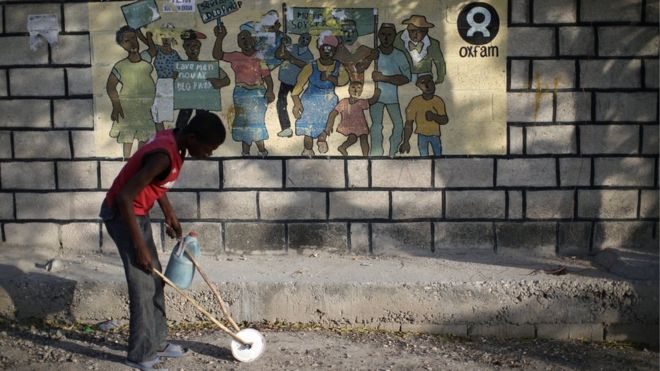
Oxfam has revealed that three of the men accused of sexual misconduct in Haiti physically threatened witnesses during a 2011 investigation.
The charity has published its internal report on alleged abuse by some of its staff following public pressure.
In the 2011 report, Oxfam said “more needed” to be done to prevent “problem staff” working for other charities.
Despite the warning, several men linked to the alleged abuse subsequently took up roles at other charities.
Oxfam – which has almost 10,000 staff working in more than 90 countries – has released a redacted version of the report, saying it wants to be “as transparent as possible” about the decisions it made.
Parts of the 11-page document are blacked out to hide people’s identities, including the names of the three men accused of intimidating witnesses.
Oxfam will present the original, unedited report to the government in Haiti on Monday and apologise for “mistakes”.
Oxfam has faced increasing international pressure over its handling of an investigation into allegations aid workers in Haiti used prostitutes.
‘Bullying and intimidation’
Seven Oxfam employees left the organisation as a result of their behaviour in Haiti in 2011, the report shows.
One employee was dismissed and three resigned for using prostitutes on Oxfam premises. The use of underage prostitutes was not ruled out.
Two more were dismissed for bullying and intimidation – one of whom also downloaded pornography – and another man was sacked for failing to protect staff.
In the report, the charity said director of operations in Haiti, Roland Van Hauwermeiren, “admitted using prostitutes” at his Oxfam residence when questioned by the investigation team.
Mr Van Hauwermeiren last week denied paying prostitutes for sex.
He was granted a “phased and dignified exit” and was allowed to resign, the report added, on the provision that he fully co-operated with the rest of the investigation.
It is not known if he is one of the suspects accused of threatening witnesses.
Another section entitled “lessons learned” sets out the need for tighter safeguarding across the industry to stop disgraced aid workers moving to new posts.
It reads: “Need better mechanisms for informing other regions/affiliates/agencies of behavioural issues with staff when they move and to avoid ‘recycling’ poor performers/problem staff.”
High-profile posts
Despite the warning, several of those implicated subsequently worked for other aid organisations, including at Oxfam.
Mr Van Hauwermeiren ended up taking another high-profile position, as the head of mission for Action Against Hunger in Bangladesh.
Action Against Hunger said it had carried out a series of checks on Mr Hauwermeiren but received no information from Oxfam of inappropriate or unethical behaviour.
Source: BBC




